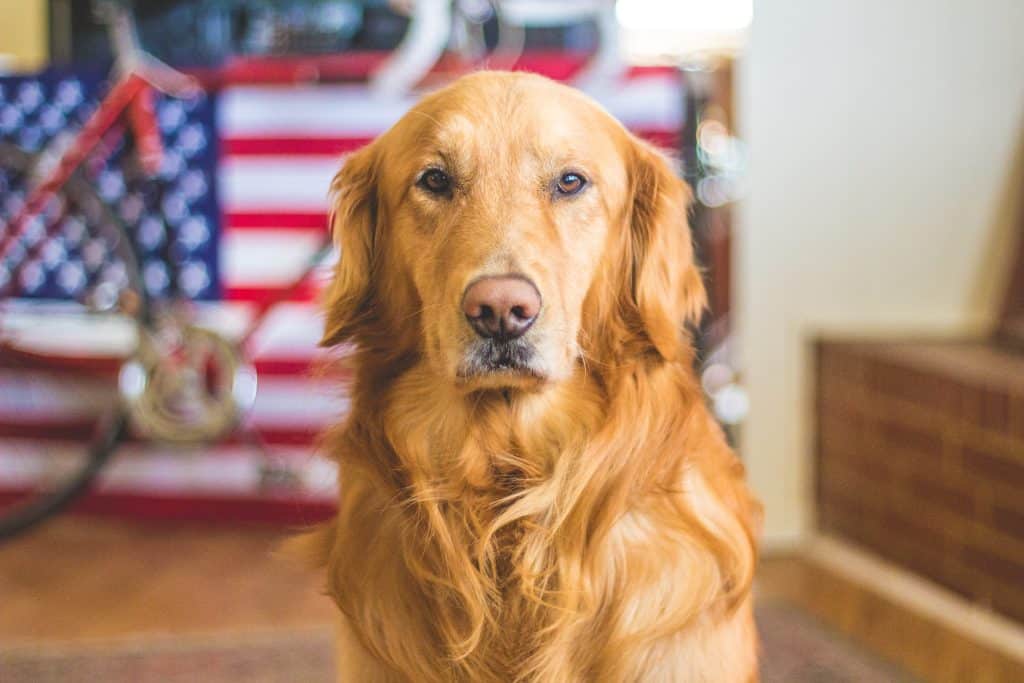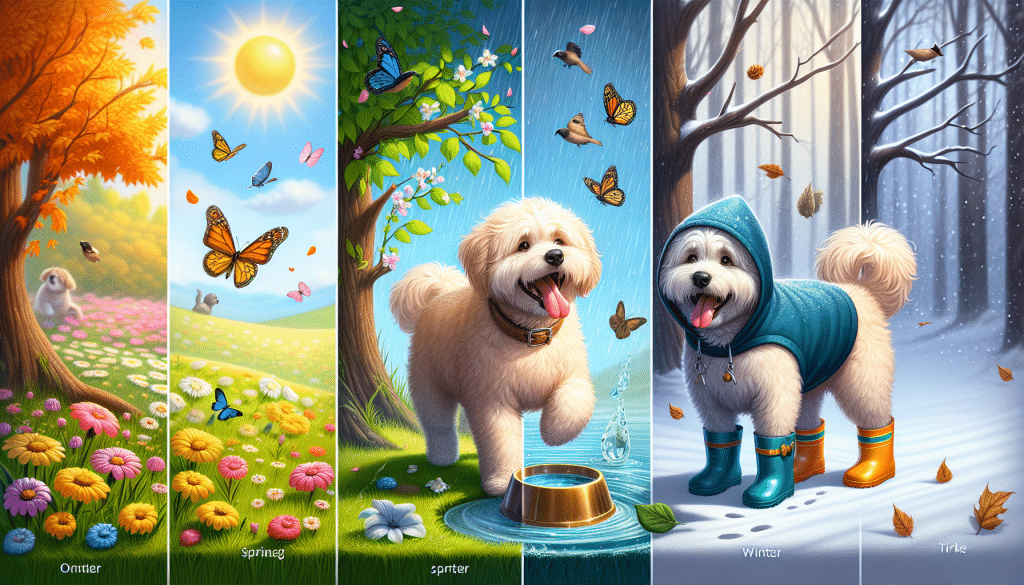As a responsible pet owner, it's important to ensure that your furry friend stays healthy and happy throughout the year. From frosty winters to scorching summers, each season comes with its own set of challenges when it comes to caring for your beloved dog. In this article, we will explore a variety of seasonal dog care tips that will guide you in keeping your four-legged companion in optimal health all year-round. Whether it's protecting their paws in the winter or safeguarding against ticks in the summer, these tips are sure to keep your dog wagging their tail and enjoying every season to the fullest.

This image is property of images.unsplash.com.
Seasonal Dog Care Tips
Taking care of your furry friend is a year-round responsibility. As the seasons change, so do the needs of your dog. By understanding the specific care requirements for each season, you can ensure that your dog remains happy and healthy throughout the year. In this comprehensive guide, we will explore the various aspects of seasonal dog care, including proper nutrition, regular exercise, grooming, vaccinations and preventive treatments, outdoor safety, and specific tips for each season. So let's dive right in and explore the best practices for keeping your dog in pristine condition throughout the year!
Proper Nutrition
Proper nutrition is essential for maintaining your dog's overall health and well-being. Just like humans, dogs require a balanced diet that provides them with the necessary nutrients to thrive and remain active. Here are some tips to ensure your dog is getting the right nutrition:
Choosing the Right Food
When it comes to selecting the right food for your dog, it's important to consider their age, breed, size, and any specific dietary requirements they may have. Consult with your veterinarian to determine the best type of food for your furry friend.
Feeding Schedule
Establishing a regular feeding schedule is crucial for your dog's digestion and overall health. Divide their daily food intake into two or three meals and feed them at the same time each day.
Weight Management
Maintaining an appropriate weight is essential to your dog's overall health. Obesity can lead to a range of health problems, including joint issues and cardiovascular diseases. Monitor your dog's weight and consult with your vet to determine the ideal weight range for their breed and size.
Supplements and Treats
Supplements can be beneficial for your dog's overall health. Omega-3 fatty acids, glucosamine, and probiotics are just a few examples of supplements that can support joint health, coat quality, and digestion. Additionally, treats can be used as rewards during training sessions, but make sure they are given in moderation to prevent weight gain.
Regular Exercise
Regular exercise is vital for your dog's physical and mental well-being. Exercise helps maintain a healthy weight, promotes cardiovascular health, strengthens muscles, and provides mental stimulation. Here are some tips to ensure your dog gets enough exercise:
Determining Exercise Needs
The exercise needs of dogs vary depending on their age, breed, and overall health. Active breeds may require more vigorous exercise, while smaller or less active dogs might need shorter and more relaxed activities. Consult with your vet to determine the appropriate exercise routine for your dog.
Outdoor Activities
Regular walks, hikes, and playtime at the park are excellent ways to provide your dog with physical exercise and mental stimulation. Remember to keep them safe by using a leash and ensuring they are under your control at all times.
Indoor Activities
When outdoor activities are limited due to weather conditions, there are plenty of indoor activities to keep your dog physically and mentally engaged. Playing fetch, interactive toys, and agility exercises can all provide great opportunities for indoor exercise.
Mental Stimulation
In addition to physical exercise, mental stimulation is crucial for your dog's overall well-being. Puzzle toys, treat-dispensing toys, and training sessions are all great ways to engage your dog's mind and prevent boredom.
Grooming
Regular grooming not only keeps your dog looking their best but also promotes good hygiene and overall health. Here are some grooming practices to incorporate into your dog's care routine:
Bathing and Shampooing
Bathing your dog on a regular basis helps in maintaining their coat cleanliness and preventing skin infections. Use a dog-specific shampoo that is gentle on their skin and coat, and follow bathing guidelines recommended by your vet.
Brushing and Coat Maintenance
Brushing your dog's coat regularly helps remove loose hair, prevents matting, and stimulates the skin and hair follicles. The frequency of brushing depends on your dog's breed and coat type, so consult with your vet or a professional groomer for specific recommendations.
Nail Trimming
Long nails can cause discomfort and even lead to injuries. Trim your dog's nails regularly or have them trimmed by a professional. Be careful not to trim too close to the quick as it can cause bleeding and pain.
Ear Cleaning
Keeping your dog's ears clean helps prevent infections and promotes good ear health. Use a gentle ear cleaner recommended by your vet and follow the instructions carefully. If your dog has excessive ear wax or discharge, contact your vet for further evaluation.
Dental Care
Maintaining good oral hygiene is essential for your dog's overall health. Regular brushing, dental chews, and annual dental cleanings performed by your vet can help prevent dental diseases and keep your dog's teeth clean and healthy.

This image is property of images.unsplash.com.
Vaccinations and Preventive Treatments
Vaccinations and preventive treatments are crucial for protecting your dog from various diseases and parasites. Here are some key points to consider:
Regular Vet Check-ups
Schedule regular visits to the veterinarian to ensure your dog receives the necessary vaccinations and preventive treatments. These check-ups also provide an opportunity for your vet to assess your dog's overall health and address any concerns.
Vaccination Schedule
Follow your vet's recommended vaccination schedule to protect your dog against diseases such as rabies, distemper, parvovirus, and hepatitis. Vaccination needs may vary depending on your dog's age, lifestyle, and local regulations.
Flea and Tick Prevention
Fleas and ticks can cause discomfort and transmit diseases to your dog. Use preventive treatments recommended by your vet to keep these pests at bay. Regularly check your dog for signs of fleas or ticks, especially after spending time outdoors.
Heartworm Prevention
Heartworm disease can be fatal for dogs. Consult with your vet to determine the appropriate heartworm preventive treatment for your dog. Administer the preventive medication as directed to keep your dog protected year-round.
Outdoor Safety
Whether you're taking your dog for a walk or allowing them to spend time in the backyard, it's important to keep them safe outdoors. Follow these tips to ensure their well-being:
Leash Training
Proper leash training is essential for your dog's safety. Teach your dog to walk calmly on a leash and to respond to basic commands. Always use a leash when outside unless you're in a designated off-leash area.
Identification Tags
Ensure your dog always wears an identification tag with their name, your contact information, and any necessary medical information. This will help reunite you with your dog in case they get lost.
Microchipping
In addition to an identification tag, consider having your dog microchipped. Microchips provide a permanent form of identification in case the collar or tag gets lost. Make sure to keep your contact information updated with the microchip registry.
Avoiding Toxic Plants
Some plants and flowers can be toxic to dogs if ingested. Familiarize yourself with common toxic plants in your area and avoid planting them in your yard or allowing your dog access to them during walks.

This image is property of images.unsplash.com.
Cold Weather Care
As the temperatures drop, it's important to take additional steps to keep your dog warm and safe. Here are some tips for cold weather care:
Creating a Warm Shelter
If your dog spends time outside, provide them with a warm and insulated shelter. Make sure it is elevated, protected from the wind, and contains blankets or bedding to keep them comfortable.
Protecting Paws from Ice and Salt
Ice can be painful and salt can be irritating to your dog's paws. Consider using pet-friendly ice melts and protect their paws with booties or paw balm when walking on icy surfaces.
Dressing for Cold Weather
Some dogs, especially short-haired breeds, may need a little extra warmth during cold weather. Consider using dog sweaters or jackets to keep them cozy when venturing outdoors.
Avoiding Hypothermia and Frostbite
Prolonged exposure to cold weather can lead to hypothermia or frostbite in dogs. Limit the time your dog spends outdoors during extreme cold weather and monitor them closely for any signs of discomfort or distress.
Hot Weather Care
Just like cold weather, hot weather poses its own set of challenges for your dog. Here are some tips to keep them cool and safe during hot weather:
Providing Shade and Fresh Water
Ensure your dog has access to shade at all times, especially during the hottest parts of the day. Provide them with fresh water at all times and consider adding ice cubes to keep it cool.
Avoiding Heatstroke
Heatstroke can be life-threatening for dogs. Avoid exercising your dog during the hottest parts of the day and be vigilant for signs of heatstroke, including excessive panting, drooling, and weakness. If you suspect heatstroke, seek veterinary attention immediately.
Protecting Paws from Hot Pavement
Hot pavement can burn your dog's paw pads. Test the pavement temperature with your hand before allowing your dog to walk on it. Consider using dog booties or walking on grassy areas to protect their paws.
Preventing Sunburn
Just like humans, dogs can get sunburned. Apply pet-safe sunscreen to areas prone to sunburn, such as the nose, ears, and lightly pigmented areas. Consult with your vet for the appropriate sunscreen for your dog.

Springtime Care
With the arrival of spring, it's time to prepare your dog for the season's unique challenges. Here are some tips for springtime care:
Spring Cleaning and Allergies
Spring cleaning often involves the use of cleaning products that can be harmful to dogs. Keep your cleaning supplies out of your dog's reach and ensure proper ventilation during cleaning. Additionally, springtime allergies can affect dogs, so watch for signs of allergies, such as excessive scratching or sneezing.
Preventing Fleas and Ticks
As the weather warms up, fleas and ticks become more active. Use flea and tick preventive treatments recommended by your vet to protect your dog. Regularly check them for ticks and use a flea comb to search for signs of fleas.
Garden Safety
If you have a garden, make sure to keep your dog away from toxic plants, pesticides, and fertilizers. Some plants and lawn treatments can be harmful if ingested, so create a safe area for your dog to enjoy without exposure to potentially dangerous substances.
Weather Changes
Spring weather can be unpredictable, with sudden temperature changes and rainstorms. Make sure your dog has a comfortable and dry place to rest indoors if the weather becomes inclement. Also, be cautious of open windows or doors that your dog may escape from during springtime excitement.
Fall and Winter Care
As we transition into fall and winter, it's important to adjust your dog's care routine accordingly. Here are some tips for fall and winter care:
Preparing for Daylight Saving Time
When the clocks change, it can affect your dog's schedule and routine. Gradually adjust their feeding and exercise times leading up to the time change to help them adapt smoothly.
Back to School Routine
If you have children going back to school, your dog's routine will likely change. Ensure your dog still receives regular exercise and mental stimulation to prevent boredom and anxiety.
Halloween Safety
Halloween can be a fun and festive time, but it also presents potential hazards for your dog. Keep them away from candy and decorations, and make sure they have a safe place inside your home during trick-or-treating festivities.
Holiday Hazards
During the holiday season, be mindful of potential hazards for your dog, including holiday decorations, holiday foods, and increased foot traffic in your home. Keep these hazards out of reach and establish a quiet and safe space for your dog to retreat to if needed.
By following these seasonal dog care tips, you can ensure that your furry friend remains healthy and happy throughout the year. Remember to consult with your veterinarian for specific advice tailored to your dog's individual needs. Cheers to a year filled with adventures, tail wags, and the joy of caring for your beloved canine companion!



